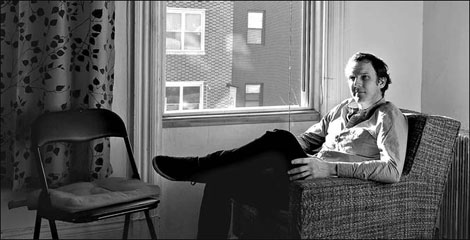The quirks of living by yourself
Updated: 2012-03-25 07:44
By Steven Kurutz (The New York Times)
|
|||||||||||
|
Rod Sherwood, who lives alone in Brooklyn, has phases of going to bed later and later until he stays up to daybreak before retiring. Robert Wright for The New York Times |
If there is any doubt that we're living in the age of the individual, a look at the housing data confirms it. For millenniums, people have huddled together, in caves, in mud huts, in houses. But these days, 1 in every 4 American households is occupied by someone living alone; in Manhattan, mythic land of the singleton, the number is nearly 1 in 2. Germany, France and Britain have a greater proportion of one-person households than the United States, as does Japan.
True, the benefits of living alone are many: freedom to come and go as you please; the space and solitude to recharge in a plugged-in world; kingly or queenly domain over the bed.
Still, the single-occupant home can be a breeding ground for eccentricities. In a sense, living alone represents the self let loose. The solo dweller is free to indulge his or her odder habits - what is sometimes referred to as Secret Single Behavior. Feel like standing naked in your kitchen at 2 a.m., eating peanut butter from the jar? Who's to know?
Amy Kennedy, 28, a schoolteacher who has a two-bedroom apartment in High Point, North Carolina, calls it living without "social checks and balances."
The effects are noticeable, she said: "I've been living alone for six years, and I've gotten quirkier and quirkier."
Among her domestic oddities: running in place during TV commercials; speaking conversational French to herself while making breakfast (she listens to a language CD); singing Journey songs in the shower; and removing only the clothes she needs from her dryer, thus turning it into a makeshift dresser.
"The entire apartment is your room," Ms. Kennedy said, by way of explanation. "If I leave a bra on the kitchen table, I don't think much about it."
In the experience of Kate Bolick, a magazine writer, living alone breeds "a very indulgent work style."
"I can work 24/7 for days on end, and I can let my whole apartment fall apart on me and not wash the dishes," she said.
 |
What emerges over time is an at-home self that is markedly different - in ways big and small - from the self they present to the world. We all have private selves, of course, but people who live alone spend a good deal more time exploring them.
Rod Sherwood's living-alone indulgences center on his sleep cycle. A music manager and record producer who works from his railroad apartment in Brooklyn, Mr. Sherwood, 40, said he'll go to bed at 2 a.m. one night, and then retire later and later by increments, "until I go to bed when the sun comes up."
He mused: "I wondered how many times in a year I repeat that cycle? I'd be interested to chart it."
Ronni Bennett, who is 70 and writes a blog on aging, timegoesby.net, has lived alone for all but 10 or so years of her adult life. She said she has adopted a classic living-alone habit: "I never, ever close the bathroom door."
Leaving it open "is one of those little habits that makes no difference most of the time," she said. But when guests visit her two-bedroom apartment outside Portland, Oregon, she added: "I have to make huge mental efforts to remind myself to close the door. Sometimes I think, Just put a Post-it note by the bathroom door. Well, wait, I don't want them to see that."
Like many, Ms. Bennett also talks to herself - or, rather, to her cat. "I'll try things out on him when I'm writing," she said. "He'll look at me like he's actually listening. I wouldn't discuss what I'm writing with my cat if someone were around."
Other people say their greatest eccentricities emerge in the kitchen. "I very rarely have what you would call 'meals,' " said Steve Zimmer, a computer programmer in his 40s who lives by himself in a Manhattan loft. Instead of adhering to regular meals or meal times, he said, he makes "six or seven" trips an hour to the refrigerator and subsists largely on cereal.
For people who are comfortable and even good at living alone, there is often another concern: a fear that the concrete has set, so to speak, on their domestic habits and that it will be difficult to go back to living with someone. "It's definitely something that worries me," Ms. Kennedy said. "I can't take the quirks back."
The longer she lives alone, she said, the less flexible she becomes - and the less considerate of others' needs. "If I go on vacation with a group of friends, I feel a little overwhelmed," she said. "I've got to share this room with other people? We have to organize showers?"
But Ms. Bennett, whose last live-in relationship ended in 1976, said she doesn't worry about being too quirky to cohabitate. "You know," she said, "I hear this stuff about 'I just have too many bad habits.' If I wanted to live with someone again, I think I could. You pull yourself back together."
The New York Times
Today's Top News
Rescuers race against time for quake victims
Telecom workers restore links
Coal mine blast kills 18 in Jilin
Intl scholarship puts China on the map
More bird flu patients discharged
Gold loses sheen, but still a safe bet
US 'turns blind eye to human rights'
Telecom workers restore links
Hot Topics
Lunar probe , China growth forecasts, Emission rules get tougher, China seen through 'colored lens', International board,
Editor's Picks

|

|

|

|

|

|






